Since it’s been so long, I’m splitting this roundup into several parts. This first one focuses away from schools and education and discipline and everything around social media.
Table of Contents
Sometimes You Come First
Yes, sometimes it is necessary to tell your child, in whatever terms would be most effective right now, to shut the hell up. Life goes on, and it is not always about the child. Indeed, increasingly people don’t have kids exactly because others think that if you have a child, then your life must suddenly be sacrificed on that altar.
This seems like the ultimate ‘no, what is wrong with you for asking?’ moment:
Charles Fain Lehman: Maybe this is a strong take, but I tend to think that adults who are not parents tend to intuitively identify with the kids in stories about families, while adults who are parents identify with the adults.
I’m not saying “people who don’t have kids are children;” I’m saying they are relatively more likely to think first about how the child would perceive the interaction, because that’s their frame of reference for family life.
Annie Wu: I ask this so genuinely — truly what is wrong with him?
Jenn Ackerman (NYT): Senator JD Vance of Ohio, during a podcast that was released on Friday, shared an anecdote about the moment former President Donald J. Trump called to ask him to be his running mate. His 7- year-old son, Vance recalled, wanted to discuss Pokémon. "So he's trying to talk to me about Pikachu, and I'm on the phone with Donald Trump, and I'm like, 'Son, shut the hell up for 30 seconds about Pikachu," he said, referring to the Pokémon mascot. ""This is the most important phone call of my life. Please just let me take this phone call."
JD Vance often has moments like this, where he manages to pitch things in the worst possible light. Actually telling your child to be quiet in this spot is, of course, totally appropriate.
The amount of childcare we are asking mothers to provide is insane, matching the restrictions we place on children. Having a child looks a lot less appealing the more it takes over your life. Time with your kids is precious but too much of it is a too much, especially when you have no choice.
[Note on graph: This involves a lot of fitting from not many data points, don’t take it too seriously.]
A thread about how to support new parents, which seems right based on my experiences. A new parent has a ton of things that need doing and no time. So you can be most helpful by finding specific needs and taking care of them, as independently and automatically as possible, or by being that extra pair of hands or keeping an eye on the baby, and focusing on actions that free up time and avoiding those that take time. Time enables things like sleep.
Let Kids be Kids
I mostly support giving parents broad discretion.
I especially support giving parents broad discretion to let kids be kids.
Alas, America today does not agree. Parents walk around terrified that police and child services will be called if a child is even momentarily left unattended, or allowed to do what were back in 1985 ordinary childhood things as if they were an ordinary child, or various other similar issues.
As in things like this, and note this is what they do to the middle class white parents:
Erik Hoel: btw my jaw dropped when I found this. Why is this number so high? How do 37% of *all* children in the US get reported to Child Protective Services at some point?
Matt Parlmer: My parents got reported to CPS for letting us play outside.
There’s a large and growing (for now lol) class of people who really hate kids and they are not shy about using the state apparatus to punish kids and the people who choose to have them, even when they aren’t even directly inconvenienced.
Nathan Young: Yeah my parents said they nearly had social workers in over some misunderstanding. Wild.
Cory: We got reported to CPS because our daughter had an ear infection that we already had a doctor's appointment for... The school even called us to ask if we knew about her ear ache.
Livia: I was reported once because of some thing my very literal autistic eldest child said once that was badly misinterpreted. (It was a short visit and she had no concerns.) My fiancé's ex reported him once because their five-year-old said there was no food in the house.
Vanyali: My niece got reported to CPS by the hospital where she gave birth for the meds the hospital itself gave her during the birth and noted in her chart. CPS said they had to do a whole investigation because “drugs”.
Jonathan Hines: My parents got reported to cps when i was a kid bc my baby sister was teething at the time, and, I presume, a neighbor didn't think having your bones slice through your own flesh could possibly cause a very young child to respond so noisily.
Poof Kitty Face: My parents once had someone call the cops on them for "child abuse." They were just sitting in their living room, watching TV. I am their only child. I was 40 years old and live 200 miles away.
Samuel Anthony: Got called on me when my kids were younger. They were playing in our fenced in front yard with our dog at the time, I was literally out there the entire time on the patio, which was shaded so impossible to see me from across the street/driving by. Very wild experience.
Carris137: Had a neighbor who did exactly that multiple times because kids were playing outside without jackets when it’s 65 and a slight breeze.
DisplacedDawg: They got called on us. The kids were in the front yard and the wife was on the porch. The neighbor couldn’t see her. The wife was still sitting on the porch when the cop showed up.
Alena: lady at the pool called not only the cops and but also CPS because we were splashing too much. she wasnt even near the pool deck.
Donna: Got reported to CPS in middle school because I went to school having a panic attack. Over going to school. Because I wanted to stay home. And I had my anxiety already on record with the school as well.
Whereas this would the The Good Place:
Elise Sole (Today): Kristen Bell and Dax Shepard dabbled in “free-range parenting” by allowing their daughters to wander around a Danish theme park alone.
On a family trip to Denmark, Iceland and Norway, the couple took their kids Lincoln, 11, and Delta, 9, to a theme park in Copenhagen, where they had complete freedom for the entire day.
…
“The hack is, when we went to Copenhagen, we stayed at this hotel that was right at Tivoli Gardens, which is a 7-acre theme park ... Anyway, the hotel opens up into the theme park and so we just were kind of like, ‘Are we going to like free-range parenting and roll the die here?’”
Bell said her daughters enjoyed their independence at the park.
…
Bell said the freedom, including for her and Shepard, was “heaven.”
…
Bell added, “When we had our first child, we said we wanted to be ‘second child parents,’ and we made an agreement that if she wanted to do something, as long as it didn’t require a trip to the hospital, she’d be allowed to do it.”
The key detail is that they did this in Copenhagen, where you don’t have to worry about anyone calling the cops on you for doing it, despite the associated interpretations of ethics. So this was entirely derisked.
The idea that a nine year old being allowed to go out on her own is ‘free range parenting’ shows how pathological we are about this. Not too long ago that was ‘parenting,’ and it started a lot younger than nine, and we didn’t have GPS and cell phones.
By the time you hit nine, you’re mostly safe even in America from the scolds who would try to sic the authorities on you. It does happen, but when it happens it seems to plausibly be (low-level) news.
I was told a story the week before I wrote this paragraph by a friend who got the cops called on him for letting his baby sleep in their stroller in his yard by someone who actively impersonated a police officer and confessed to doing so. My friend got arrested, the confessed felon went on her way.
This is all completely insane. There are no consequences to calling CPS, you can do it over actual nothing and you cause, at best, acute stress and potentially break up a family.
If we had reasonable norms once CPS showed up this would presumably be fine, because then you could be confident nothing would happen, and all have a good laugh. But even a small chance of escalating misunderstandings is enough.
Then recently we have the example where an 11-year-old (!) walked less than a mile into a 370-person town, and the mother was charged with reckless conduct and forced to sign a ‘safety plan’ on pain of jail time pledging to track him at all times via an app on his phone.
Billy Binion: I can't get over this story. A local law enforcement agency is trying to force a mom to put a location tracker on her son—and if she doesn't, they're threatening to prosecute her. Because her kid walked less than a mile by himself. It's almost too crazy to be real. And yet.
Whereas Megan McArdle points out that at that age her parents rarely knew where she was, and also, do you remember this?
That was the rule. If it was 10pm, you should check if you knew where your children are. Earlier on, whatever, no worries. As it should (mostly) be.
It is odd to then see advocates push hard for what seem like extreme non-interference principles in other contexts? Here the report is from Rafael Mangual, who resigned in protest from a committee on reforming child abuse and neglect investigations in New York.
The result is a report that, among other things, seeks to make it harder for a child in long-term foster care to be adopted. I refuse to put my name to this report.
The committee also wants to make it easier for felons to become foster parents. They want to eliminate legal obligations for certain professionals, like pediatricians and schoolteachers, to report suspected child abuse and neglect. And they want to eliminate people’s ability to report such concerns anonymously.
They also want to make it so that drug use by parents, including pregnant mothers, won’t prompt a child welfare intervention.
…
Last week, for example, The Free Press reported that Mass General Brigham hospital will no longer consider the presence of drugs in newborns a sufficient cause for reporting a problem, because this phenomenon “disproportionately affects Black people,” the hospital explained.
Mary (from the comments): I was a CASA volunteer for a few years (Court Appointed Special Advocate).
…
But by the training to become a volunteer, and more so as I interacted with the staff on my reports to the court, it was clear (sometimes directly stated) that the goal above all else was family reunification. I was counseled not to include anything in my reports that might be upsetting to the parent (as the reports are provided to the parent's attorney and presumably to the parent).
This was to avoid the parent from feeling uneasy or unduly judged (even if the judgment was quite *due*). Being censored, and contributing to a system that put returning the child to the parent above the risk of continuing harm to the child... I couldn't do it.
Notice the assumption here. Reporting potential problems is considered a hostile act.
The whole idea is to protect the child, who is also black. If the impact of reporting a drug problem in a black child is net negative to black people, then that is the same as saying reporting drug problems is net negative. So stop doing it. Or, if it is not net negative, because it protects the child, then not reporting would be the racist action.
For the other stuff, all right, let’s talk more broadly.
If you think that drug use by a pregnant mother should not prompt a child welfare intervention, at least not automatically? I can see arguments for that.
What I cannot see is a world in which you get your child potentially taken away when they are allowed to walk two blocks alone at age eight, but not for parental drug use.
In general, I see lots of cases of actively dangerous homes where the case workers feel powerless to do anything, while other parents go around terrified all the time. We can at least get one of these two situations right.
Similarly, I kind of do think that it is pretty crazy that you can anonymously say you think I am a terrible parent, and then the authorities might well turn my life upside down. And that it has terrible impacts when you legally mandate that various people be snitches, driving people in need away from vital help and services. The flip side is, who is going to dare report, in a way that will then be seen as attempting to ruin someone’s life and family, and invite retaliation? So it is not easy, but I think there is a reason why we have the right to face our accusers.
In other completely crazy rule news:
Carola Conces Binder: Today at the local park with my 5 kids, I was told I needed a permit to be there with a group of more than 5 people. I said that they were my own kids and he said I still needed a permit!
Tim Carney: Really? Where?
Carola Conces Binder: Apparently it's because we were by the picnic tables.
A generalized version of this theory is to beware evolutionary mismatch. As in, we evolved in isolated tribes of mixed age with consistent world models, where kids would have adult responsibilities and real work throughout and competion with real stakes and gets smacked down by their elders when needed.
Now we do the opposite of all of that and more and are surprised kids often get screwed up. We are not giving them the opportunity to learn how to exist in and interact with the world.
Instead, we have things like this.
0xMert: I've found it
The perfect sentence to describe Canada.
"Home runs are not allowed."
How is this a real place man.
Also, don’t you dare be competitive or play at a high level. Unacceptable.
Also wow, I did not see this objection coming.
Divia Eden: Lots of people on online forums seem to be super against kids playing hide and seek, since I guess the thinking is that it teaches them to hide from their parents???
At the ages my kids were most interested in hide and seek they were… extremely bad at hiding lol.
This is one of many opinions I have yet to encounter in someone I have been in a position to have an actual back and forth conversation with
If you think playing Hide and Seek is dangerous you flat out hate childhood.
This comes from Cartoons Hate Her asking about insane fearmongering. The thread is what you think it will be.
Cartoons Hate Her: PARENTS: what is the most unhinged fear mongering thing you’ve ever seen in a mom group or parenting forum? Bonus points if it actually freaked you out. (For an article)
Not talking about actual deaths/injuries, more like safety rules or concerns
Miss Moss Ball Girl Boss: I’m sorry but it’s hilarious that every reply to you about some issue has multiple replies to them freaking out about said issue. It’s so funny.
Or here’s the purest version of the problem:
Lenore Skenazy: Sometimes some lady will call 911 when she sees a girl, 8, riding a bike. So it goes these days.
BUT the cops should be able to say, "Thanks, ma'am!"...and then DO NOTHING.
Instead, a cop stopped the kid, then went to her home to confront her parents.
Lenore is too kind. I mean, yes, sometimes they do call 911, and it would be a vast improvement to simply say ‘thanks, ma’am’ and ignore. But the correct answer is not ‘thanks, ma’am.’
The policeman assured her no, it wasn't that. Rather, a woman had called the police because she was "upset that a child was outside."
Eskridge informed the cop that it was not illegal for children to be outside. He agreed but implied that Eskridge needed to take that up with the woman.
There is another way.
Here’s the story of two moms who got the local street closed for a few hours so children could play, and play the children did, many times, without any planning beyond closing the street. This both gives ample outdoor space, and provides safety from cars, which are indeed the only meaningful danger when kids are allowed to play on their own.
There are a number of European cities that have permanently shut down many of their roads, and they seem better for it. We should likely be shutting down roads simply for children’s play periodically in many places, and generally transition out of needing to use cars constantly for everything.
The other finding is that this led to many more connections between neighbors, as families realized they lived near other families, including classmates, and made friends. You start to get a real neighborhood, which brings many advantages.
But even if we don’t do that, you can also simply let the children play anyway. Even the cars do not pose that big a threat, compared to losing out on childhood.
Location, Location, Location
Strip Mall Guy, obviously no stranger to other places (and a fun source of strip mall related business insights), runs the experiment, and concludes raising kids is better in New York City than the suburbs. I couldn’t agree more:
Strip Mall Guy: We've been debating whether to stay in New York City long-term to raise our kids or move to the suburbs like many families we know have done.
We spent the past week in a suburban house to see how it compared. The quiet was nice, and we enjoyed swimming in the pool. My son loved having all that space to run around.
But one major downside stood out: our constant reliance on a car.
The hassle of getting the kids in and out, navigating traffic, finding parking, and then repeating the process at each stop was a real barrier.
In New York City, going out for lunch with the kids is as simple as walking a couple of blocks.
You don’t think about it—you just walk out of the lobby and head in any direction.
One time this week, we got home and realized we forgot something at the grocery store. In New York, one of us would just take four minutes to grab it. In the suburbs?
Forget it. It’s a whole ordeal in comparison.
Having your dentist three blocks away, walking six minutes for a haircut, four minutes for ice cream, or twelve minutes to the park is a game-changer when you have kids.
We don’t have a car in New York, and we never even think about it.
Is this a deal-breaker? No. But we’re not ready to make that trade-off any time soon.
It just feels so much easier to raise kids in the city.
50 times in and out of the car later….how do you guys do this 😝😝😝
There is one huge downside, which is that it costs a lot of money. Space here is not cheap, and neither are other things, including private schools. Outside of that consideration, which I realize is a big deal, I think NYC is obviously a great place to raise kids. It is amazing to walk around, to not have to drive to things, to not even have to own a car, to have tons of options for places to go, people to see and things to do.
Connection
This Lyman Stone thread covering decline in time spent with friends, especially in the context of being a parent, has some fascinating charts.
First, we have the sharp decline in time spent with friends, especially after Covid.
And we also have the same decline in time spent with friends plus children, which includes playdates.
Whereas time with children has not actually increased? Which is actually odd, given the increasing demands for more and more supervision of children.
Lyman Stone: So, what happened in the mid-2010s to change the social space of motherhood to make motherhood a more isolated experience? my theory? the mommy wars, i.e. branded parenting styles that "are just what's best for kids."
Ruth and I hear from so many parents who worry that they're doing something "wrong." Or like if they parent the way they think is right, the Parent Police will jump out of the bushes and arrest them. Or have (legitimate) fears somebody will call CPS.
If I let my kid play in the back yard will somebody call CPS? What about the front yard? It's worth noting just between 2017 and 2021, the rate of "screened out" (i.e. not credible) CPS calls rose from 42% to 49%: people are making more unfounded CPS calls.
…
The upshot here is a lot more parents are carrying around the idea that there's a narrow range of acceptable parenting practices, and deviating from that range meaningfully harms kids, and being perceived to deviate could have severe consequences.
…
My theory is that as parenting has just gotten more debated, heterogenous, and seen as high-stakes, it has become uniquely hard for women to socialize as mothers.
I'm not sure the right solution to this. I'm not here to promote the new parenting style of No Labels Parenting. But I see these dynamics on all "sides" of the Mommy Wars. The Boss Moms, the Trad Wives, they're all peddling these stories about their parenting style.
Whole thread is worthwhile. I essentially buy the thesis. When kids are involved, we increasingly are on hair triggers to disapprove of things, tell people they’re doing something wrong, and even call social services. And everyone is worried about everyone else. It is infinitely harder to start up conversations, make friends with other parents, chill, form an actual neighborhood and so on.
Also, of course, the competition for your attention is way higher. It’s so, so much harder than it used to be to engage with whoever happens to be there. Phone beckons.
The Education of a Gamer
First you tell them they cannot play outside. Then you tell them they can’t play inside.
Multiplayer online games (and single player games too) have varying quality, and many have questionable morality attached to their content. But for those that are high quality and that don’t actively model awful behaviors, they seem pretty awesome for teaching life skills? For socialization? For learning to actually do hard work and accomplish things?
I mean, yes, there are better options, but if you won’t let them do real work, and you won’t let them be on their own in physical space, isn’t this the next best option?
Prince Vogelfrei: I swear on my life having access to a world away from authority where you sink or swim on your own terms and are trying to accomplish something with friends you choose is one of the most important experiences any teenager can have. For many the place that's happening is online.
John Pressman: It's especially incredible when you consider that the relevant experiences are nearly totally simulated, and with AI will likely eventually be totally simulated. It has never been cheaper or safer to let kids have such experiences but we're moral panicking anyway.
Prince Vogelfrei: Horror stories circulate among parents, the "it saved my life" stories only circulate among the kids and then a few years after the fact.
John Pressman: Looking back on it, it likely did save my life. I was relentlessly bullied in middle school and had negative utilitarian type depression over it. The Internet let me have friends and understanding that there existed a world beyond that if I kept going.
Prince Vogelfrei: Yep, also wouldn't be where I am now without College Confidential, was raised in an isolated environment where the kinds of knowledge on that forum were otherwise inaccessible.
My principle has consistently been that if my kid is trying to improve, is working to accomplish something, and is not stuck in a rut, then that is great. Gaming is at least okay by me, and plausibly great. You do have to watch for ruts and force them out.
Cognitive endurance is important. Getting kids to practice it is helpful, and paper says it does not much matter whether the practice is academic or otherwise. Paper frames this as an endorsement of quality schooling, since that provides this function. Instead, I would say this seems like a strong endorsement for games in general and chess in particular. I’d also echo Tyler’s comment that this an area in which I believe I have done well and that it has paid huge benefits. Which I attribute to games, not to school. I’d actually suggest that school often destroys cognitive endurance through aversion, and that poor schools do this more.
Priorities
In South Korea, babies born right after their World Cup run perform significantly worse in school, and also exhibit significantly higher degrees of mental well-being. This is then described as “Our results support the notion of an adverse effect on child quality” and “Our analysis reveals strong empirical evidence that the positive fertility shock caused by the 2002 World Cup also had a significant adverse effect on students’ human capital formation.” And that this ‘reflects a quantity-quality tradeoff.’
I can’t help but notice the part about higher mental well-being? What a notion of ‘quality’ and ‘human capital’ we have here, likely the same one contributing to Korea’s extremely low birth rate.
The proposed mechanisms are ‘lowered parental expectations’ and adverse selection. But also, perhaps these parents were and found a way to be less insane, and are making good decisions on behalf of their children, who are like them?
From everything I have heard, South Korea could use lowered parental expectations.
Childcare
If you use price controls, then there will be shortages, episode number a lot.
Patrick Brown: Child care in Canada is starting to look a lot like health care in Canada - nominally universal, but with long waiting lines acting as the implicit form of rationing, particularly for low-income parents.
Financial Post: According to the poll, 84 per cent of B.C. families with young children (i.e., aged one to 12) either strongly agree (52 per cent) or moderately agree (32 per cent) that "long waiting lists are still a problem for families who need child care." Among parents who have used child care in B.C., 39 per cent say that for their youngest child the wait time before a child care space became available was more than six months, including 15 per cent who say it was more than two years.
To make matters worse, the families who are poorest and who need child care most are the ones with the least access. Among parents who currently have a young child, 43 per cent report waiting over six months and 19 per cent over two years; among households with annual income under $50,000, 49 per cent report a wait time over six months and 25 per cent a wait time over two years.
Allocation by waitlist rather than price seems like a rather terrible way to get child care, and ensures that many who need it will go without, while some who value it far less do get it. Seems rather insane. Seriously, once again, can we please instead Give Parents Money (or tax breaks) already?
Sweden is going the other way. They are paying grandparents for babysitting.
Tyler Cowen approves, noticing the gains from trade. I have worries (about intrinsic motivation, or about the ease of fraud, and so on). But certainly paying grandparents to do childcare seems way better than paying daycare centers to do childcare? It is better for the kids (even if the daycare is relatively good) and better for those providing care. Indeed it seems massively destructive and distortionary to pay for daycare centers but not other forms of care.
Here’s an interesting abstract.
Abstract: This paper asks whether universal pre-kindergarten (UPK) raises parents’ earnings and how much these earnings effects matter for evaluating the economic returns to UPK programs. Using a randomized lottery design, we estimate the effects of enrolling in a full-day UPK program in New Haven, Connecticut on parents’ labor market outcomes as well as educational expenditures and children’s academic performance. During children’s pre-kindergarten years, UPK enrollment increases weekly childcare coverage by 11 hours. Enrollment has limited impacts on children’s academic outcomes between kindergarten and 8th grade, likely due to a combination of rapid effect fadeout and substitution away from other programs of similar quality but with shorter days.
In contrast, parents work more hours, and their earnings increase by 21.7%. Parents’ earnings gains persist for at least six years after the end of pre-kindergarten. Excluding impacts on children, each dollar of net government expenditure yields $5.51 in after-tax benefits for families, almost entirely from parents’ earnings gains. This return is large compared to other labor market policies.
Conversely, excluding earnings gains for parents, each dollar of net government expenditure yields only $0.46 to $1.32 in benefits, lower than many other education and children’s health interventions. We conclude that the economic returns to investing in UPK are high, largely because of full-day UPK’s effectiveness as an active labor market policy.
Tyler Cowen: Note by the way that these externalities end up internalized in higher wages for the parents, so at least in this data set there is no obvious case for public provision of a subsidized alternative.
The obvious case for the subsidy is that it is profitable. Even if you assume a relatively low 20% marginal tax rate, for every $1 in costs spent here, parents will pay an additional $1.38 in taxes, and also collect less from other benefit programs.
Perhaps parents should be willing to pay up in order to internalize those gains. But the results show very clearly that they are not willing to do that. In practice, if you want them to do the work, they need the extra push, whether or not that is ‘fair.’
Tyler Cowen reports via Kevin Lewis on a new paper by Chris Herbst on the ‘Declining Relative Quality of the Child Care Workforce.’
I find that today’s workforce is relatively low-skilled: child care workers have less schooling than those in other occupations, they score substantially lower on tests of cognitive ability, and they are among the lowest-paid individuals in the economy. I also show that the relative quality of the child care workforce is declining, in part because higher-skilled individuals increasingly find the child care sector less attractive than other occupations
My response is:
Good.
Not good enough.
As in, we have massive government regulation of those providing childcare, requiring them to get degrees that are irrelevant to the situation and needlessly driving up costs, along with other requirements. Prices are nuts. Skill in childcare is not going to correlate with ‘tests of cognitive ability’ nor will it be improved by a four-year college degree let alone a master's.
The real problems with childcare are that it is:
Too expensive.
Often too hard to find even at expensive prices.
Often understaffed, because staff is so expensive.
Hard to monitor, so some places engage in various forms of fraud or neglect.
I would much rather have cheaper childcare, ideally with better caregiver ratios, using a larger amount of ‘lower skilled’ labor.
Division of Labor
You are sending your child off to camp.
Would you pay $225 per trunk to have everything washed, folded and returned to your front door? I wouldn’t, because I presume I could get a much cheaper price. But I’d pay rather than actually have to handle the job myself. My hourly rate is way higher. I do not think this task helps us bond. I do find the ‘won’t let the housekeeper do it’ takes confusing, but hey.
Now suppose the camp costs $15,000, and comes with a 100+ item packing list. Would you outsource that if you could? Well, yes, obviously, if you don’t want to have your kid do it as a learning experience. I sure am not doing it myself. The camp is offloading a bunch of low value labor on me, is this not what trade is for?
Also, 25 pairs of underwear and 25 pairs of socks for a seven-week camp? What? Are they only giving kids the chance to do laundry twice? This is what your $15k gets you? Otherwise, what’s going on?
A lot of this seems really stupid. Can’t the camp make its own arrangement for foldable Crazy Creek chairs?
Another example:
Tara Weiss (WSJ): “Color War” is its own sartorial challenge. At this epic end-of-summer tournament, campers sport their team’s color and compete in events. But since the kids don’t know what color they’ll be assigned, parents often pack for four possibilities.
The packing service price is higher than I’d prefer, but it sure beats doing it slower and worse myself:
Anything not already marked gets labeled along the way. For prep and packing days, Bash charges $125 per hour, and $100 per hour for an additional packer. It takes three to six hours, depending on the number of campers per household.
…
Camp Kits’ bundles of toiletries, costing from $98-$185, magically appear on bunks before camp starts -without the parents lifting a finger.
I see why people mock such services, but they are wrong. Comparative advantage, division of labor and trade are wonderful things.
Early Childhood
Of all the Robin Hanson statements, this is perhaps the most Robin Hanson.
Robin Hanson: Care-taking my 2yo granddaughter for a few days, I find it remarkable how much energy is consumed by control battles. Far more than preventing harm, learning how to do stuff. Was it always thus, or is modern parenting extra dysfunctional?
You'd think parents & kids could quickly learn/negotiate demarcated spheres of control, & slowly change those as the kids age. But no, the boundaries are complex, inexplicit, and constantly renegotiated.
No, I would not think that. I have children.
It does confuse me a bit, once they get a few years older than that, why things remain so difficult even when you provide clear incentives. It is not obvious to me that it is wrong, from their perspective, to continuously push some boundaries, both to learn and to provide long term incentives to expand those boundaries and future ones. The issue is that they are not doing this efficiently or with good incentive design on their end.
Often it is version of ‘if I give you some of nice thing X, you will be happy briefly then get mad and complain a lot. Whereas if I never give you X, you don’t complain or get mad at all, so actually giving you a responsible amount of nice thing X is a mistake.’
The obvious reason is that kids are dumb. It is that simple. Kids are dumb. Proper incentive design is not hardwired, it is learned slowly over time. And yeah, ultimately, this is all because kids are dumb, and they don’t have the required skills for what Hanson is proposing.
Great Books
Romiekins: Sorry for being a snob but if you are a grown adult you should be embarrassed to tell the class your favorite book is for nine year olds. Back in my day we lied about our favourite books to sound smart and I stand by that practice.
The context is reports that many new college students are saying their favorite books involve Percy Jackson.
C.S. Lewis: When I was ten, I read fairy tales in secret and would have been ashamed if I had been found doing so. Now that I am fifty I read them openly. When I became a man I put away childish things, including the fear of childishness and the desire to be very grown.
I cannot endorse actual lying, but I do want people to be tempted. I want them to feel a bit of shame or embarrassment about the whole thing if they know their pick sucks, and to have motivation to find a better favorite book. You have a lot of control over the answer. For all I know, those Percy Jackson books are really great, and you definitely won’t find my favorite fiction book being taught in great works classes (although for non-fiction you would, because my answer there is Thucydides).
Mental Health
Drawing children’s attention to poor mental health often backfires, to the point where my prior is that it should be considered harmful to on the margin medicalize problems, or tell kids they could have mental health issues. Otherwise you get this.
Ellen Barry (NYT): The researchers point to unexpected results in trials of school-based mental health interventions in the United Kingdom and Australia: Students who underwent training in the basics of mindfulness, cognitive behavioral therapy and dialectical behavior therapy did not emerge healthier than peers who did not participate, and some were worse off, at least for a while.
And new research from the United States shows that among young people, “self-labeling” as having depression or anxiety is associated with poor coping skills, like avoidance or rumination.
In a paper published last year, two research psychologists at the University of Oxford, Lucy Foulkes and Jack Andrews, coined the term “prevalence inflation” — driven by the reporting of mild or transient symptoms as mental health disorders — and suggested that awareness campaigns were contributing to it.
“It’s creating this message that teenagers are vulnerable, they’re likely to have problems, and the solution is to outsource them to a professional,” said Dr. Foulkes, a Prudence Trust Research Fellow in Oxford’s department of experimental psychology, who has written two books on mental health and adolescence.
…
“Really, if you think about almost everything we do in schools, we don’t have great evidence for it working,” he added. “That doesn’t mean we don’t do it. It just means that we’re constantly thinking about ways to improve it.”
Obviously, when there is a sufficiently clear problem, you need to intervene somehow. At some point that intervention needs to be fully explicit. But the default should be to treat problems as ordinary problems in every sense.
David Manuel looks at Haidt’s graph of rising diagnoses of mental illness, points out there are no obvious causal stories for actual schizophrenia, and suggests a stigma reduction causing increased reporting causing a stigma reduction doom loop.
Decrease in stigma leads to an increase in reporting1
Increases in reporting lead to a further decrease in stigma
Repeat steps 1 and 2 over and over
Ben Bentzin: This could just as likely be:
1. Increase in social status for reporting mental health issues
2. Increases in status leads to a further increase in reporting
3. Repeat steps 1 and 2 over and over
That’s effectively the same thing. Reducing stigma and increasing resulting social status should look very similar.
Could this all be ‘a change in coding,’ a measurement error, all the way?
Michael Caley: lol it’s always a change in coding.
I don't think this means it's fine for kids to have social media at 14 but it's a compelling explanation of the "mental health crisis" data -- we are mostly not having a teen mental health crisis, we just are doing a better job looking into teen mental health because of Obamacare.
Alec Stapp: This is the most compelling case I’ve seen against the idea that smartphones are causing a mental health epidemic among teens. Apparently Obamacare included a recommended annual screening of teen girls for depression and HHS also mandated a change in how hospitals code injuries.
No. It is not simply a ‘change in coding,’ as discussed above. There is a vast increase in kids believing they have mental health issues and acting like it. This is not mainly about what is written down on forms. Nor does a change to how you record suicidal ideation account for everything else going up and to the right.
Are we getting ‘better’ at looking into mental health issues? We are getting better at finding mental health issues. We are getting better at convincing children they have mental health problems. But is that… better? Or is it a doom loop of normalization and increasing status that creates more real problems, plausibly all linked to smartphones?
I think any reasonable person would conclude that:
Older data was artificially low in relative terms due to undermeasurement.
Changes in diagnosis and communication around mental health, some of which involves smartphones and some of which doesn’t, have led a feedback loop that has increased the amount and degree of real mental health issues.
Phones are an important part, but far from all, of the problem here.
Nostalgia
Do modern kids have ‘anemonia’ for the 90s, nostalgia for a time they never know when life was not all about phones and likes and you could exist in space and be a person with freedom and room to make mistakes?
I don’t know that this is ‘anemonia’ so much as a realization that many of the old ways were better. You don’t have to miss the 90s to realize they did many things right.
That includes the games. Every time my kids play games from the 80s or 90s I smile. When they try to play modern stuff, it often goes… less well. From my perspective.
Natalian Barbour: No kid remembers their best day in front of the TV.
Kelsey Piper: When I ask people about their most treasured childhood memory, video games are on there pretty frequently. It changed how I think about parenting.
Good video games are awesome. They are absolutely a large chunk of my top memories. Don’t let anyone gaslight you into thinking this is not normal.
Some People Need Practical Advice
Mason reminds us of the obvious.
Mason: "Parenting doesn't impact children's outcomes" is an absolutely senseless claim made by people who don't understand how variables are distinguished in the studies they cite, and yes, that's a different argument than "genetics don't matter."
For the record, people who say this don't actually believe it, and if they did they would have dramatically different opinions about how children should be produced and raised.
It is a deeply silly thing to claim, yet people commonly claim it. I do not care what statistical evidence you cite for it, it is obviously false. Please, just stop.
Dominic Cummings provides concrete book and other curriculum suggestions for younger students. Probably a good resource for finding such things.
Can three car seats fit into a normal car? This is highly relevant to the questions of On Car Seats as Contraception. I’ve seen claims several times that, despite most people thinking no, the answer is actually yes:
Timothy Lee: I keep hearing people say three car seats won’t fit in a normal five seat car and it’s not true. We have three close-in-age kids and have managed to get their car seats into multiple normal sized cars.
Specifically: Subaru Impreza and Kia Niro. Both small hatchbacks/crossovers. Oldest and youngest kids are 5 years apart.
No apple no life: Is one of them a booster without high back?
Timothy Lee: Yes.
No apple no life: Cool. Two high-backs/car seats and one backless booster will definitely fit in a Model Y as well but it’s going to be a tight squeeze and probably not something i’d want to take on a road trip.
David Watson: I have just two, and it just _looks_ like it's impossible, but I haven't yet had a reason to check
Eric Hoover: It’s more about the age spread so that all 3 aren’t the big high back booster
The LLM answer is ‘it is close and it depends on details,’ which seems right. There are ways to do it, for some age distributions, but it will be a tight squeeze. And if you have to move those seats to another car, that will be a huge pain, and you cannot count on being able to legally travel in any given car that is not yours. Prospective parents mostly think it cannot be done, or are worried that it cannot be done, and see one more big thing to stress about. So I think in practice the answer is ‘mostly no,’ although if you are a parent of three and do not want a minivan you should totally at least try to make this happen.
If you ever want to do something nice for me?
Paul Graham: Something I didn't realize till I had kids: Once people have kids it becomes much easier to figure out how to do something nice for them. Do something that helps their kids.
I am not always up for working to make new (adult) friends, even though I should be (he who has a thousand friends has not one friend to spare). But I am always looking for my kids to make more friends here in New York City.



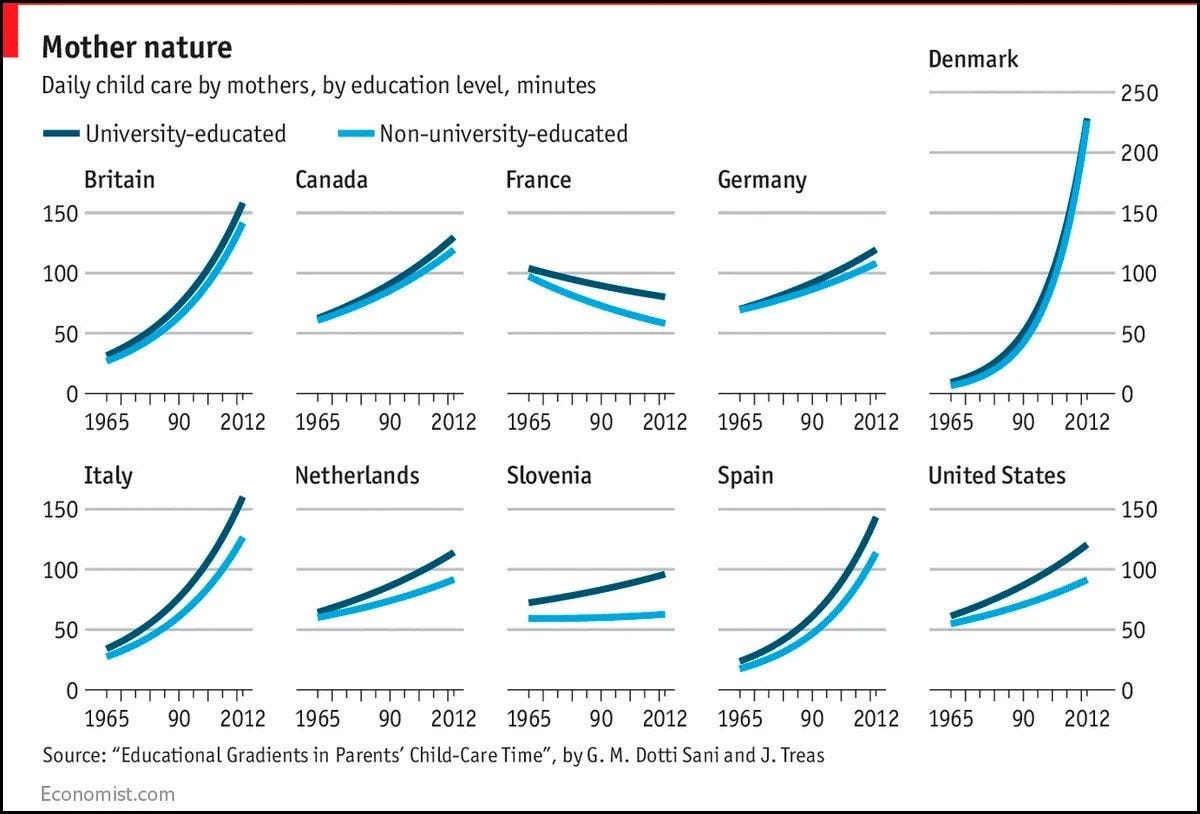
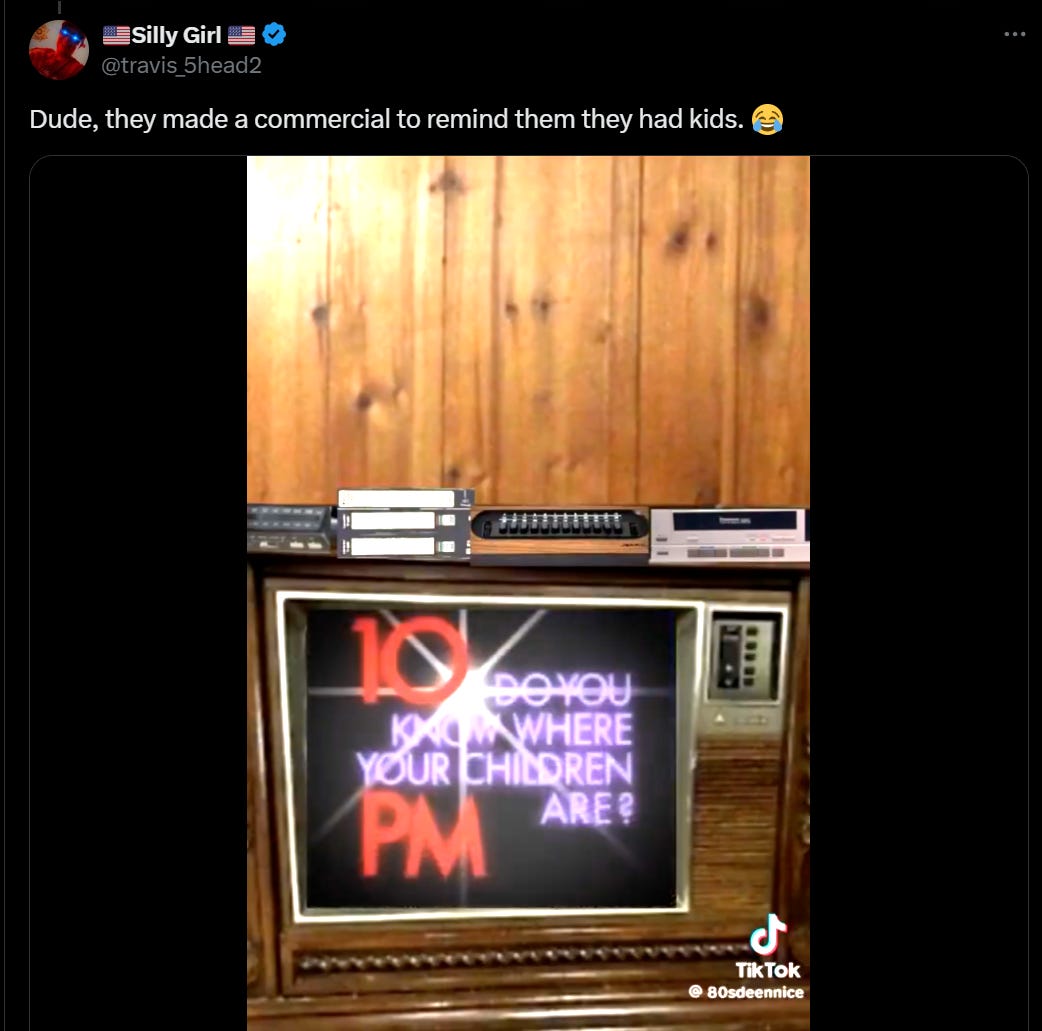
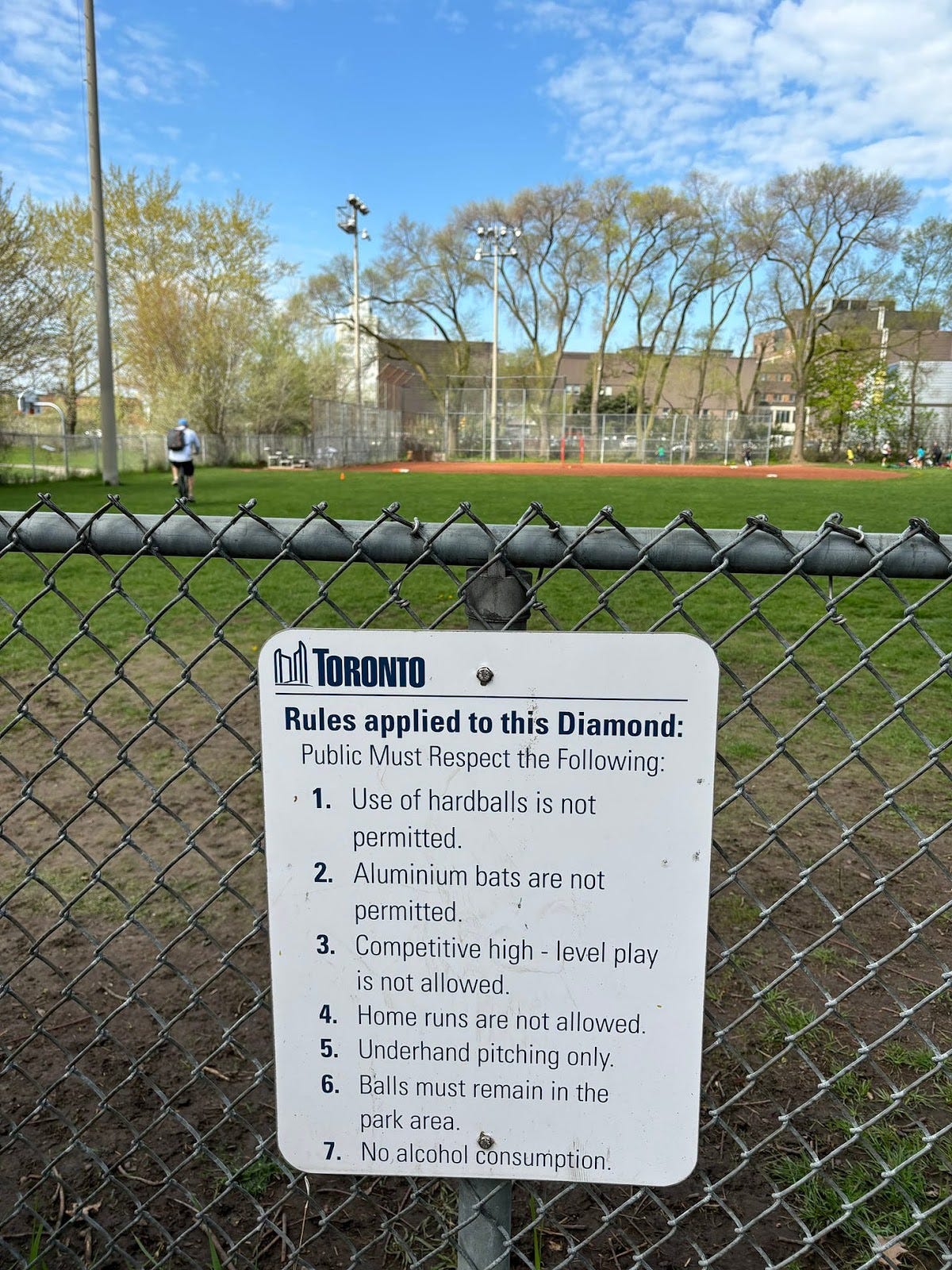
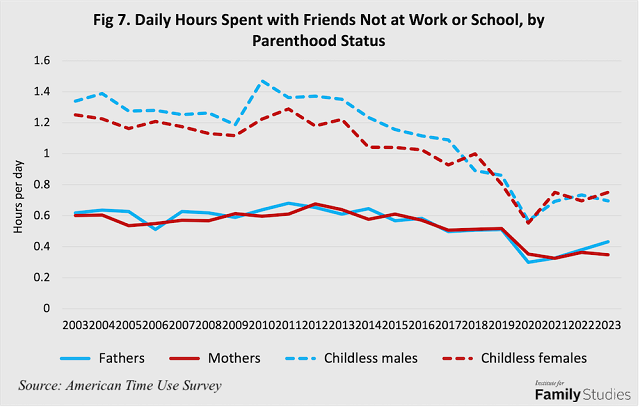
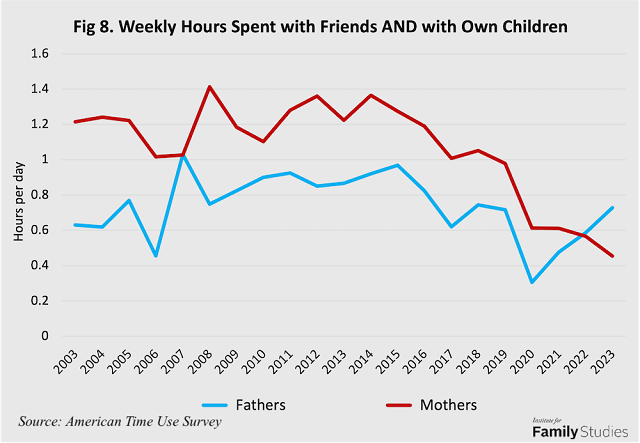
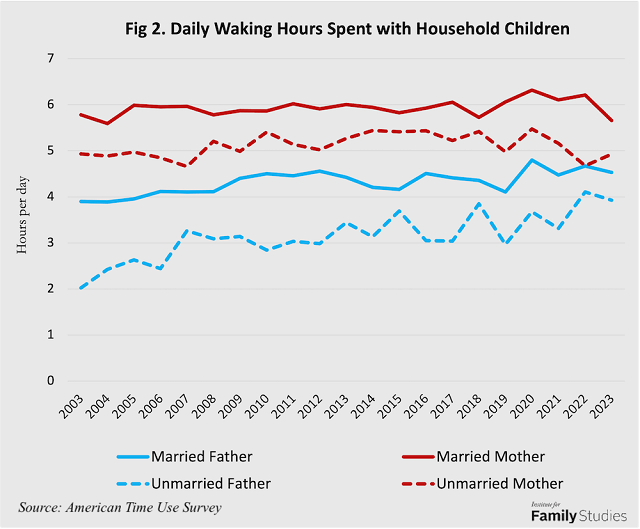
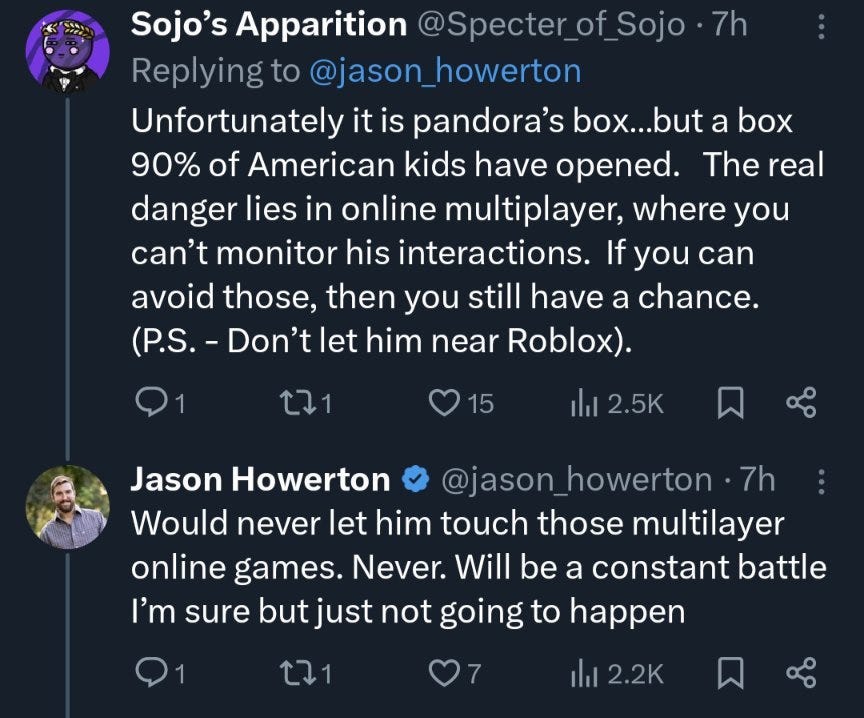
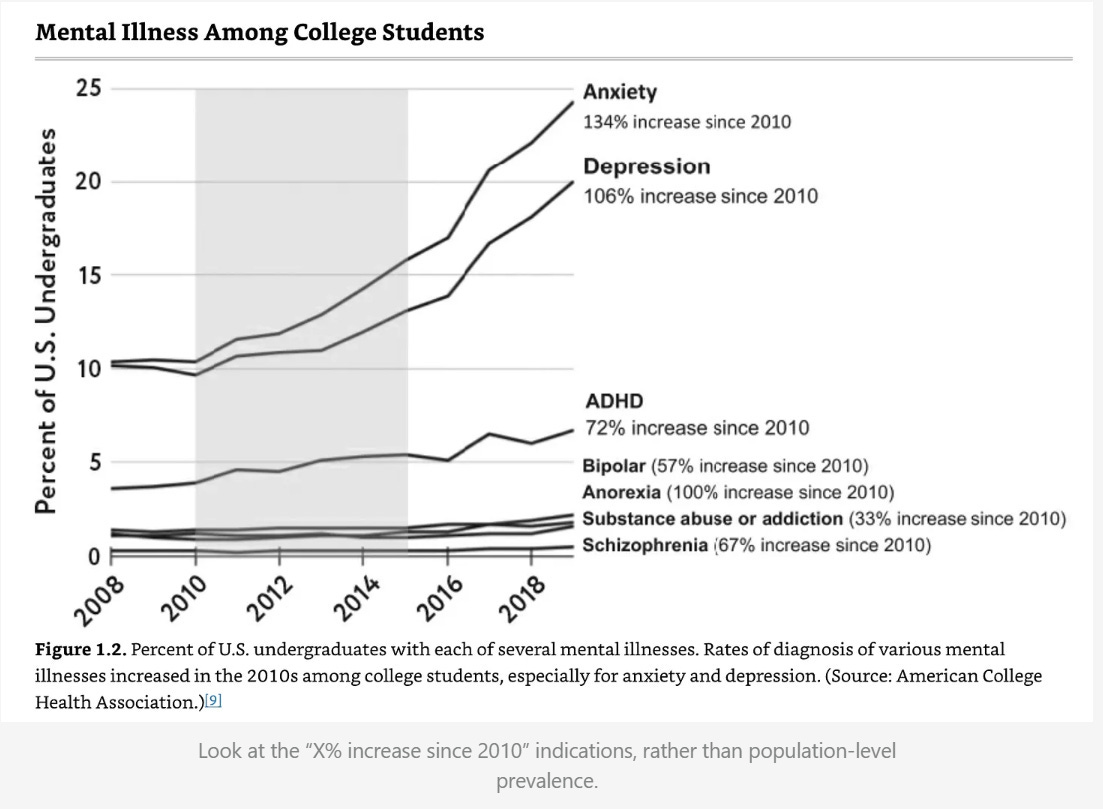
You're leaving us hanging on your favorite fiction book?!
As I was reading about time spent parenting, a thought occurred to me: kid's sports are taking up a lot of my time, for very little actual time the kids play sports. We're talking about pretty casual, community-center type sports for my kids (I have six, ages 2-10), not travel teams or anything. But even that just takes so much time! My four year old had a baseketball game yesterday afternoon, and my six and seven year old kids had a basketball game later that afternoon.
Watching four year olds play basketball is kind of hilarious, but it takes, from the time we start getting ready (looking for her jersey, finding shoes, getting a water bottle, etc.) to when we get home, maybe an hour and a half. And for all of that, she plays maybe 12 minutes of game time.
Compare that to just shooting baskets with the neighbor kids on the driveway. In the same hour and a half, they could get 90 minutes of basketball in, with ZERO time from me! Plus the benefit of figuring out some framework for a game among themselves, resolving conflicts, etc. Sports are great, but I'm wondering if my wife and I shouldn't find ways for them to play sports that don't require so much of our time. It's eating up huge amounts of our time, especially on weekends.
I'd be interested in thoughts on some alternative approaches here.